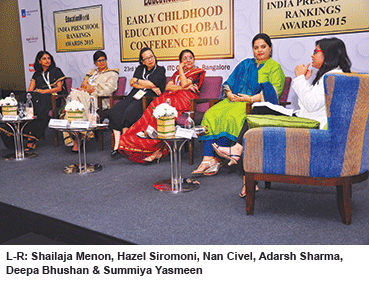PANEL DISCUSSION
Do we need to set minimum learning outcomes in ECCE?
 The second panel discussion chaired by Summiya Yasmeen (SY), managing editor of EducationWorld, featured Dr. Shailaja Menon (SM), professor at the School of Education, Azim Premji University, Bangalore; Deepa Bhushan (DB), head of Billabong High International schools; Hazel Siromoni (HS), director of Maple Bear India; and keynote presenters Nan Civel (NC) and Dr. Adarsh Sharma (AS). In a high-voltage debate, the panel debated ‘Do we need to set minimum learning outcomes in ECCE?’. Excerpts from the lively 90-minute discussion.
The second panel discussion chaired by Summiya Yasmeen (SY), managing editor of EducationWorld, featured Dr. Shailaja Menon (SM), professor at the School of Education, Azim Premji University, Bangalore; Deepa Bhushan (DB), head of Billabong High International schools; Hazel Siromoni (HS), director of Maple Bear India; and keynote presenters Nan Civel (NC) and Dr. Adarsh Sharma (AS). In a high-voltage debate, the panel debated ‘Do we need to set minimum learning outcomes in ECCE?’. Excerpts from the lively 90-minute discussion.
SY: The context of this debate is that India doesn’t have a national ECCE curriculum setting minimum learning levels, though a National ECCE Policy was approved in 2013 by the UPA II government. Consequently, preschools in the private sector devise their own curriculums and pedagogies. Most countries including the US, UK and Singapore have prescribed minimum child development outcomes — cognitive, emotional, social, language and literacy, etc — in ECCE. Do we need to prescribe them in India as well?
AS: In academic circles, we have developed several curriculum frameworks and policies for ECCE. But all this research is confined to books and documents. There is no link between research and policy in India. That’s the big problem. The babu or bureaucrat goes by his whims and decides what’s good for children. Therefore, I am not surprised that we haven’t been able to set any clear child outcomes in ECCE. All exist on paper, nobody has been able to standardise and implement them.
HS: Unfortunately, few educators in India have a clear understanding of what is ECCE. We still loosely use ‘playschool’ to describe an ECCE centre, and parents and primary schools have different expectations of pre-primary education. First we need to evolve a consensus as to what’s the objective of ECCE and then draw up age-appropriate learning outcomes. There is no dispute that the early years are critical to helping children develop the skills needed to become independent learners. Poor ECCE results in poor primary-secondary learning outcomes. In Pisa 2011 (Programme for International Student Assessment) which measures the learning outcomes of 15-year-olds worldwide, Indian students were ranked second last among 74 countries. Instead of addressing this problem, India has withdrawn from the test.
SM: Learning outcomes is a controversial issue, and across the country there’s a live academic debate about whether we need to set them. The audience needs to understand the nuances of this debate. The National Policy on Education 1986 defined minimum levels of learning for primary-secondary children, as did the National Curriculum Framework (NCF) 2000. But NCF 2005 declined to set minimum learning outcomes for school children. Now we are talking about introducing minimum learning outcomes for children in early years education. Delegates here need to know why standardised learning outcomes were eliminated for older children. The reason is that humans are bio-social cultural beings. They are different because of differences in language, culture, child rearing practices, and societal expectations. In a highly heterogeneous society, setting standardised learning outcomes is dangerous if imposed in a heavy-handed top-down way. We need to open up for dialogue and reflect on whether standard learning outcomes need to be set for children and what they should be.
DB: Even though government hasn’t prescribed minimum learning outcomes for children in ECCE, primary schools have already set minimum learning levels children should attain to qualify for admission into class I. Parents also expect children to achieve certain learning levels. Therefore, considerable pressure is exerted on preschools to prepare children to attain these outcomes. However, learning outcomes are not confined to academics but also encompass attitudes, social and emotional competencies.
SY: Nan, what is the Malaysia experience?
NC: Thirty years ago when a member of the Malaysian government’s social department inspected The Children’s House, she came armed with standards and benchmarks. So three decades ago, Malaysia had already set minimum ECCE standards and outcomes. Over the years, the government has refined these standards, but in close consultation with parents and ECCE experts.
SY: On the other hand, in India government and academics are shying away from prescribing minimum levels of learning. In fact, government policy has become anti-learning outcomes. For instance, the RTE Act is completely inputs-focused rather than outcomes oriented. How can we build a national consensus in favour of setting minimum learning outcomes in ECCE?
AS: Outcomes are dependent on inputs and other factors in learning environments, including competent teachers. Therefore the caution about setting minimum learning outcomes. Instead of outcomes, it would be preferable to prescribe a framework within which preschools should operate. Otherwise, there will be premature stress and pressure on youngest children to learn. In Delhi preschool children are being forced by parents to attend tutorial classes to become primary school-ready.
SM: One of the big dangers in terms of setting learning outcomes is that it encourages educators to work backwards. Because class I children need to have certain learning competencies, we are pushing children in ECCE to attain them. The National Association for the Education of Young Children in the US has strongly cautioned against this tendency because the development needs of youngest children are very different.
HS: I agree. There’s growing pressure on preschools to prepare children for primary schooling which is damaging. That’s why the framework proposal outlining minimum learning levels in ECCE, is invaluable. Within the prescribed framework, preschool teachers should have the flexibility to make learning outcomes contextual. We also need to address the problem of poor teacher training programmes in ECCE. The B.Ed curriculum should train and skill all teachers to nurture pre-primary children.
SM: Countries which have set minimum learning standards are not necessarily fairer or more equitable societies. I work with children in rural India and acknowledge the reality of poor student learning outcomes. But by focusing on approaches that put pressure on pre-primaries to improve learning outcomes will not necessarily create an equitable society. We need to address larger systemic and societal issues. Concerted efforts must be made to involve teachers as equal partners in education.
AS: The process is more important than the outcome. Every child is born with the ability to learn. We need to create environments which give her spontaneity and freedom to naturally and willingly learn.
DB: While it’s essential to set minimum outcomes guidelines for ECCE centres, parent education is equally important. Parents need to be educated about the objectives of ECCE and agree to accept age-appropriate developmental milestones, so they don’t exert pressure on preschools and children to strive to attain academic learning prematurely.




























